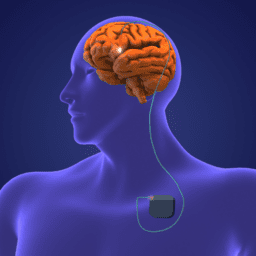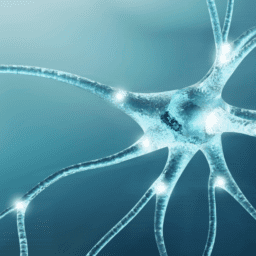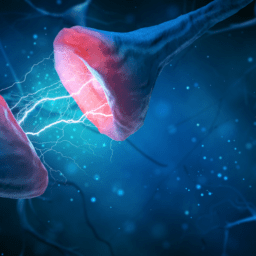MEDI and MIND-ful eating for Parkinson’s. Cough medicine as a powerful treatment. Inflammation, genes, and Parkinson’s. Neuron protection in just six minutes. YOPD on the stage. Here’s all of the Parkinson’s news we’ve collected in January, 2023.
PARKINSON’S News ARTICLES from january 2023
- Findings from a study published in npj Parkinson’s Disease suggest that the formation of toxic alpha-synuclein aggregates is one of the earliest critical events driving Parkinson’s that is associated with mutations in the SNCA gene.
- Also published in npj Parkinson’s Disease, a study led by researchers at the National Institute on Aging and National Institute of Neurological Disorders and Stroke demonstrated the ways a machine learning algorithm can accurately classify people with Parkinson’s based on their predicted rate of progression throughout the five years following diagnosis.
- A U.K.-based case-control study published in JAMA Neurology showed a significant association between taking antiepileptic drugs (AEDs) and Parkinson’s. The research, conducted by a team at the Queen Mary University of London, supports previous studies suggesting that AEDs can interfere with dopamine pathways.
- In the journal Nutrients, researchers explain how Mediterranean-style eating plans can help people with Parkinson’s manage and reduce symptoms. In comparing the Mediterranean (MEDI) and the Mediterranean-DASH Intervention for Neurodegenerative Delay (MIND) ways of eating, the MIND plan was shown to produce greater benefits in symptom reduction. The analyses, which reviewed data from more than 1,000 people with Parkinson’s, showed that the most beneficial foods for Parkinson’s symptom management were berries, vegetables, nuts, beans, and fish.
- Researchers in China who analyzed data from people living in seven different countries found that people with Parkinson’s had increased levels of potential pro-inflammatory bacteria, genes, and pathways compared to people without Parkinson’s while also having lower levels of potential anti-inflammatory bacteria, genes, and pathways. The findings add to the growing body of research that highlights how inflammation may help clinicians predict and treat Parkinson’s.
- Clinicians in Louisville, Kentucky’s Norton Neuroscience Institute have begun utilizing the Syn-One Test to confirm Parkinson’s diagnoses in a matter of minutes via a simple skin test.
- Technology developed at the Indian Institute of Technology, Bombay has been shown to be 95 percent effective in detecting Parkinson’s and works by amplifying alpha-synuclein aggregates in the blood.
- Research published in The Journal of Physiology explains how short but intense cycling exercises increase the production of brain-derived neurotrophic factor (BDNF), which promotes neuroplasticity and neuron survival. Data showed that just six minutes of high-intensity exercise can protect the brain and delay the onset of neurodegenerative conditions, including Parkinson’s.
- Inspired by research published last year, researchers at the National Institutes of Health (NIH) analyzed data from several large databases to investigate associations between viruses (such as the flu and coronavirus) and six neurodegenerative conditions, including Alzheimer’s and Parkinson’s. While they found several interesting associations, experts say that the study contains several caveats and weaknesses. They also remind the public that the demonstrated links between viruses and neurological conditions are only associations and do not prove the viruses are actually causing the conditions.
- In Science, organic chemists from the University of California, Los Angeles, explain how they created the first synthetic version of lissodendoric acid A, a molecule found in certain sea sponges that may have the potential to treat Parkinson’s and similar conditions.
- Scientists in Taiwan have constructed a new metric, called the Parkinson’s Disease Social Functioning Scale (PDSFS), designed to measure a person with Parkinson’s social functioning. The researchers investigated whether PDSFS scores are associated with cognitive status and found that, in Parkinson’s, general cognitive function, activities of daily living, and neuropsychiatric symptoms are significantly related to social functioning. The study was published in BJPsych Open.
- Results from a small study published in Clinical Parkinsonism & Related Disorders showed that people with REM sleep behavior disorder (RBD) (a common early sign of Parkinson’s) were significantly more likely than people without RBD to incorrectly believe their sense of smell was normal when, in fact, it wasn’t.
- Data from a retrospective cohort study in Japan showed that people with Parkinson’s who had the highest C-reactive protein-to-albumin ratio (CAR) — a measure of inflammation that can be evaluated through a routine blood test — were up to three times more likely to die from any cause than those with the lowest CAR. The findings, published in Heliyon, suggest that CAR may be a reliable prognostic biomarker for Parkinson’s.
PARKINSON’S treatments and THERAPIES
- New analyses of data from a large-scale, Phase 3 clinical trial showed that one year of treatment with Duopa (carbidopa/levodopa enteral suspension) led to fast and sustained reductions in motor fluctuations and improved symptom control in people with advanced Parkinson’s. The findings were published in Clinical Parkinsonism & Related Disorders.
- Researchers at University College London will enroll 300 people with Parkinson’s in a two-year clinical trial to evaluate the efficacy of ambroxol (a medicine currently used to manage cough and other respiratory conditions) in treating Parkinson’s. Ambroxol has been shown not only to clear away mucus in the lungs but also to increase levels of glucocerebrosidase (also known as GCase) in the brain. Because GCase can reduce alpha-synuclein (which has long been known to accumulate in the brains of people with Parkinson’s), researchers believe ambroxol has the potential to be a powerful way to treat Parkinson’s symptoms and possibly slow its progression.
- NeuroDerm Ltd. reported highly positive results from the Phase 3, multi-center, randomized, double-blind, double-dummy BouNDless trial investigating ND0612, a continuous, subcutaneous infusion of liquid carbidopa/levodopa designed to treat Parkinson’s-related motor fluctuations. Data showed that ND0612 was well tolerated and more effective than oral carbidopa/levodopa in increasing ON time without dyskinesia (the trial’s primary endpoint). Results also demonstrated positive and clinically meaningful results for the key secondary endpoint (related to OFF time) and three additional secondary endpoints.
- A study published in Scientific Reports showed that deep brain stimulation (DBS) of the subthalamic nucleus had no significant effect on metacognition.
- In other DBS news, researchers in Germany found that subthalamic DBS significantly reduced motor and non-motor symptoms in people with early-onset Parkinson’s, regardless of whether the person had a Parkinson’s-related gene mutation. The study, which investigated the ways genetic factors influence the way people with early-onset Parkinson’s respond to DBS, was published in Frontiers in Neurology.
- Results from a retrospective, real-world, observational study showed a lower mortality risk in people with Parkinson’s disease psychosis (PDP) who were treated with NUPLAZID (pimavanserin) compared to other atypical antipsychotics over a one-year period. NUPLAZID is currently the only medication approved by the U.S. Food and Drug Administration (FDA) to treat PDP-related hallucinations and delusions.
- Through a new collaboration, Neurocrine Biosciences and Voyager Therapeutics will partner to advance multiple gene therapies for the treatment of Parkinson’s and other neurological conditions. The collaboration will help advance Voyager’s GBA1 gene therapy program for Parkinson’s (and other GBA1-mediated diseases) and also includes three gene therapy programs directed to rare CNS targets.
- Results from a pre-clinical rat model trial suggest that golexanolone, an investigational small molecule, has the ability to reverse Parkinson’s-related cognitive and motor symptoms. The molecule, which works by blocking neurosteroids, also minimized signs of fatigue, anxiety, and depression in the rat model.
- A study published in eClinicalMedicine showed that 12 weeks of electroacupuncture therapy—a form of acupuncture in which the needles are stimulated with a low electrical current—improved motor function and quality of life (and provided some relief from constipation) in people with Parkinson’s.
- Mesdopetam, a drug candidate developed through a partnership between Irlab Therapeutics and Ipsen, failed to hit the primary endpoint of a Phase 2 trial that had hoped for a clinically significant reduction in the number of hours people with Parkinson’s experienced dyskinesia.
- The FDA has lifted the full Clinical Hold on Inhibikase Therapeutics’ c-Abl inhibitor IkT-148009, which in animal studies has been shown to halt Parkinson’s progression, protect and restore neurons, and clear the underlying protein pathology of Parkinson’s. Inhibikase is currently working to re-open clinical trial sites and initiate screening and enrollment of participants for the trial.
- In other IkT-148009 news, findings from a study published in Science Translational Medicine support the belief that the treatment may have potential as a disease-modifying therapy for Parkinson’s.
- Results from a rat model study of Parkinson’s conducted in Egypt suggest that evening primrose oil can improve nerve cell survival and may reduce neuroinflammation due to its anti-inflammatory capabilities.
- Preliminary results from a study published in the European Journal of Medical Research suggest that taking part in an “exergame” program (where a person plays a video game that requires active movement) in addition to standard rehabilitation therapies can improve motor and cognitive Parkinson’s symptoms more than standard rehabilitation alone.
PARKINSON’S LIVING WELL STORIES
- Aura Oslapas, who is living with Parkinson’s and knows just how complicated it can be to track symptoms, medications, and more, has created a free smartphone app, StrivePD, to help herself and others with Parkinson’s live well. Users can log new and ongoing symptoms, medications, side effects, and more, then easily share this data with their physicians.
- At Cedarville University’s DeVries Theatre, actor and writer Matthew Moore will star in “What I Didn’t Say: A Journey Through Parkinson’s”, a play he wrote to describe his journey with young-onset Parkinson’s (YOPD).
- Inspired by two women who are living with Parkinson’s, Sequoia Lowe wrote and produced an uplifting song and video about life with Parkinson’s. The record, based on Eminem’s song “Slim Shady,” is titled “Slim Shaky.” Lowe expanded the project by producing a music video as well.
PARKINSON’S SURVEYS, CLINICAL TRIALS, and volunteer opportunities
- PreActive PD Study – This study, available for both English and Spanish speakers, implements an occupational-therapist-delivered physical activity behavior change coaching intervention in people with early-stage Parkinson’s. The study is based upon a recent single-arm cohort feasibility study (Pre-Activate PD/HD) that evaluated acceptability, implementation, and resulting effect estimates of the Pre-Activate PD intervention in 13 participants. The intervention provides one-on-one coaching sessions from an occupational therapist to individuals newly diagnosed with Parkinson’s. The individualized structured support in the sessions is aimed at facilitating and optimizing exercise uptake as part of an effective self-management program. Learn more and enroll here.
- YOPD Survey – A doctoral student in occupational therapy at Russell Sage College is conducting a research study to determine the impact of Young Onset Parkinson’s Disease on cognition, quality of life, and life roles. If you received a Parkinson’s diagnosis before age 60, you can learn more and complete the survey here.
- Phoenix-Area Residents – Deep Brain Stimulation (DBS) and Exercise Study at Barrow Neurological Institute – This study aims to help researchers learn more about how aerobic exercise affects symptoms of Parkinson’s and the quality of life in people who have DBS. They will also look at brain wave activity using the Medtronic Percept DBS device in order to better understand what changes in the brain might be caused by exercise and how that affects Parkinson’s symptoms. Reach out to Markey if interested.
- Colorado Oral Strengthening Device – The University of Colorado is looking for adults with Parkinson’s to participate in a research study exploring how a novel low-technology device can achieve an increase in tongue strength comparable to standard-of-care exercise using tongue depressors but with the kinematics and simple biofeedback of existing high-cost devices. Research has shown that tongue resistance exercises paired with biofeedback have resulted in improved tongue strength to support chewing, control of food and liquid in the mouth, and propulsion of material for a swallow. Learn more and enroll here.
- PD GENEration – The Parkinson’s Foundation has announced a major expansion of its national study to make genetic testing and counseling more available for people with Parkinson’s. The study (NCT04057794) hopes to enroll 15,000 people in all 50 US states, Puerto Rico, and the Dominican Republic. Details are available here. For questions about enrollment, email genetics@parkinson.org. Know someone who speaks Spanish and wants to learn more and maybe participate in the study? Share this link.
- Parkinson’s Progression Markers Initiative – In an expanded study, the Parkinson’s Progression Markers Initiative (PPMI) is currently working to enroll up to 100,000 people with and without Parkinson’s. The study team is especially seeking to enroll people diagnosed with Parkinson’s in the past two years and who are not yet on treatment, as well as people 60 and older who aren’t living with Parkinson’s but have a risk factor for it (such as a close relative with Parkinson’s, a known Parkinson’s-associated mutation, and/or REM sleep behavior disorder). The observational study is also enrolling people with no known connection to Parkinson’s to serve as a control group. Learn more here.
- TOPAZ (Trial of Parkinson’s and Zoledronic Acid) – Caroline Tanner, MD, PhD, is recruiting participants for a new remote clinical trial led by a team of Parkinson’s experts at UCSF in partnership with researchers from across the country. The study aims to help people with Parkinson’s or parkinsonism maintain their independence by reducing the risk of hip fractures. The study will test if zoledronate, an FDA-approved medication for osteoporosis, can prevent fractures in people with Parkinson’s, whether or not they have osteoporosis. To learn more, visit the study website at TOPAZstudy.org, email TOPAZ@ucsf.edu, or call (415) 317-5748.
- Join Google and LSVT in Project Euphonia – LSVT Global has partnered with Google on an exciting research project called Project Euphonia to help improve automatic speech recognition software for people with speech disorders. These disorders may make using devices like Google Home, The Nest, and other Smart devices, Siri, Alexa, or speech-to-text frustrating. To do this, LSVT Global needs samples of disordered speech to train the system. You are encouraged to enroll if you’ve been diagnosed with Parkinson’s, PSP, MSA, or CBD with mild, moderate, or severe speech disorders. Participation is easy, can be done from your own home, and can earn you a $60 gift card! Learn more here.
- G2019S LRRK2 Parkinson’s: Increasing Awareness and Genetic Testing Program – This program aims to support the development of precision medicine intended to treat people with genetic forms of Parkinson’s. Up to 15% of cases of Parkinson’s disease have an underlying genetic cause, yet many people have never had genetic testing. This research program will be very important in supporting the future development of a new oral precision medicine treatment for one of the most common genetic forms of Parkinson’s, aimed at slowing its progression. To learn more, visit geneticpd.com.
- A PD Avengers research group is undertaking a new project called Sparks of Experience, designed to be more systematic about collecting and considering the experiences and ideas that come from the curious minds of people living with Parkinson’s. “In the past, these sometimes quirky ideas inspired by lived experience have turned into significant new directions for research. It could be said we are trying to capture serendipity,” the team says. To learn more and get involved, see the flyer here.
- Game-based Exercise Project – Researchers at the University of Auckland are investigating how games can be used as potential rehabilitation systems. This project aims to develop suitable game-based exercise experiences to help people living with Parkinson’s. If you are 45 or older, living with a chronic condition such as Parkinson’s, and/or are experiencing age-related health conditions, you are invited to participate in a survey that will help the researchers to understand the community’s interests in games and gameplay in the context of exercise and rehabilitation. To learn more and take the 15-minute survey, see the flyer here.
- SPARX3 – A Phase 3 Clinical Trial about Exercise and Parkinson’s – This research team is currently seeking volunteers to participate in a clinical trial about the effects of aerobic exercise on people with Parkinson’s. Learn more and see if you qualify here. For more details, contact Katherine Balfany at SPARX3@ucdenver.edu.
- PAIRing Up – If you are a person with Parkinson’s or a care partner to someone with Parkinson’s, you are invited to participate in an online survey to address neuropsychiatric (cognition, depression, anxiety) concerns in Parkinson’s. The survey aims to learn about the needs and priorities for clinical care, education, support, and research related to neuropsychiatric symptoms. To learn more and participate, click here to download the flyer.
- A multidisciplinary research team in the UK is investigating how to best use music to help people with Parkinson’s manage symptoms related to movement and mood. This includes research about music for dancing and is the first study to incorporate the new Dance Sophistication Index for people with Parkinson’s. To learn more and take a 30-minute survey, click here.
- The University of Oulu and collaborators from Aalborg University, Fraunhofer University, the University of Manchester, the University of Glasgow, the University of Lisbon, and the University of Melbourne, are conducting a survey for people with Parkinson’s and Parkinson’s care partners about self-care. Complete the survey here to share your self-care strategies and techniques. You can also review ideas submitted by others and add them to your own self-care toolbox.
- Home-based Exercise and Cognitive Behavior Therapy – University of Alabama in Huntsville
- Speech and Telemedicine Study – The Purdue Motor Speech Lab
- Parkinson’s and Service Dogs – University of Groningen, Netherlands
- Neurology Study Interest Registry – University of Rochester
- Park Test – University of Rochester
For more of what’s new in Parkinson’s news, check out our full series here.
WANT MORE PRACTICAL ARTICLES LIKE THIS?
You can learn much more about living well with Parkinson’s today through our Every Victory Counts® suite of resources. Each manual is packed with up-to-date information about everything Parkinson’s. Click the link below to reserve your manual(s).

















